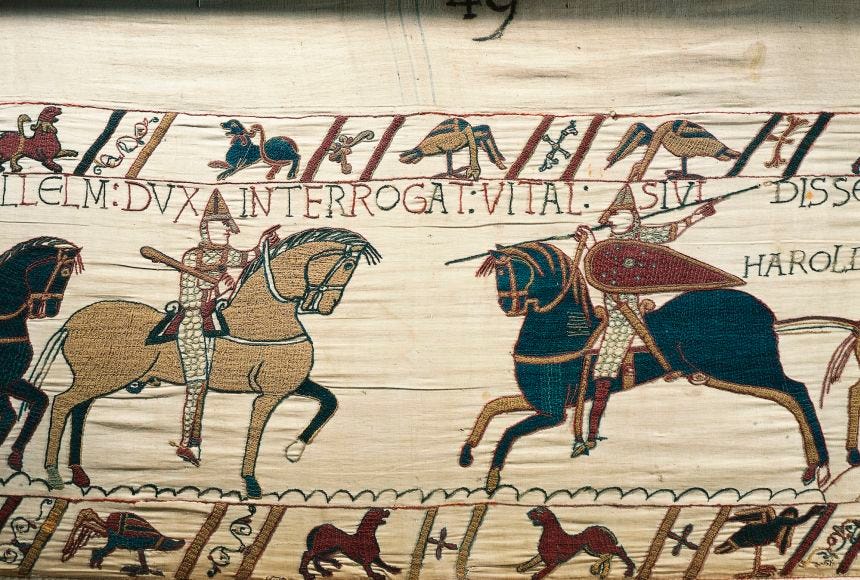Why does the English language boast the most powerful literature in the world?
It’s a bold statement, and potentially an untrue one, but I’m biased, and there’s plenty of evidence to back me up.
For one, English has become the ‘lingua franca’ of the Western world (the term ‘lingua franca’ meaning literally ‘Frankish tongue’ in Italian, originating from when the ‘lingua franca’ was, you guessed it, French). You might argue, “well, the ubiquity of English stemmed from America, an English-speaking country, becoming a global superpower, not because of any supremacy in the actual language.” And fine. That’s true. Languages become dominant when the political and military powers that speak those languages assert that dominance.
It’s kind of like how English became English in the first place. Old English borrowed a lot of words from Latin, probably because the Roman Empire was in control of England for about half a century starting sometime around A.D. 43. Then, after the Normans invaded England in the 11th century, the English language went through another revolution, adopting thousands of French words. English has taken on more and more foreign ‘help’ since then, and the adoption of Greek and Latin into our language continues to this day.
Somewhere along the way (and things are about to get very subjective here), circumstance, fate, or just dumb luck happened to create the greatest language in all of existence.
This whole train of thought was inspired by this video, which I recommend that you watch.
In the video, my new favorite YouTuber, RobWords, talks about how English could have been an entirely different language if there had been no external influence from French, Greek, or Latin, and if the language had been derived only from its Anglo-Saxon roots.
There are some purists on the subject, who argue that Anglo-Saxon words are more concise and powerful than their foreign-derived counterparts. There’s truth to this. One piece of information that I found particularly fascinating from the video is that Winston Churchill wrote his speeches by choosing predominantly Anglo-Saxon words with a small amount of syllables.
It worked, obviously—people loved Churchill, and those short, pithy speeches went down in history. There must be something particularly emotional about Anglo-Saxon words. George Orwell actually spoke about this in his famous essay “Politics and the English Language,” criticizing the foreign, mostly Greek and Latin-derived words that were, in his opinion, littering the English language. He argued that these long, fancy-sounding words didn’t have the same power as their Anglo-Saxon equivalents, and argued that it was actually possible for people to intentionally obscure the meaning of their language by using them in excess.
However, if you read an article from The Anglish Times, you probably can’t help but notice that, while interesting, purely Anglo-Saxon derived English is nowhere near as beautiful as the English that we typically speak today.
John and I have talked about this. He’s learning Italian, and one of the first things he observed is that the Italian language sounds beautiful all the time. Italian speakers do not need to deliberately try to make their speech sound pleasing to the ear the way that English speakers do.
However, we’re English writers, so I promptly reminded John of his roots and chimed in to defend the English language.
There’s a reason we have the best literature in the world. It’s because our language is more variable—it can be harmoniously beautiful or revoltingly ugly, concise and powerful or meek and delicate.
This is kind of an Orwellian idea, also. I don’t remember which essay this comes from, but Orwell wrote somewhere that English people were not as artistic as the rest of Europe. Countries such as France and Italy excelled at painting and music, while the English contributions to these arts were unimpressive. However, the one art in which the English reigned supreme was literature. Englishmen were very good writers.
I think it’s inherent to the language itself. The Germanic roots of English lend the language its power, and the Latin roots have granted it its beauty.
I don’t speak any other languages, so I don’t really know what I’m talking about and am (mostly) kidding. I think I’m onto something, though, so if there are any polyglots reading this, please chime in.
Thank you for reading. If you enjoy these posts and would like to support my work, consider becoming a free or paid subscriber.
You can also buy me a coffee—a phrase which, incidentally, has entirely Germanic roots. Are you persuaded yet?



Wonderful Melissa! I agree with much of what you say. Esoterically English is known as The Liars Language. The best language for lawyers. One of the reasons is (told to me by a lawyer) you can change your position easily in English. Example: Do or Don't, huge difference but when spoken hard to tell the difference. Often if people say this word or a word like it I usually then ask for clarity: excuse me did you say do or don't.
Esoterically also each letter has a different numerology # and if you notice names which start with for example A or J have more energy/power to them though there is more to it than that. Consider: Jesus, John, James etc.
This was a delightful little hike into the language of my birth. The English language is robust enough to satisfy all my verbal wanderlust as I find profound word gardens right here in my back yard. I sometimes wonder what a pun looks like in another language. Still, regardless of the spoken tongue, all words are metaphors.